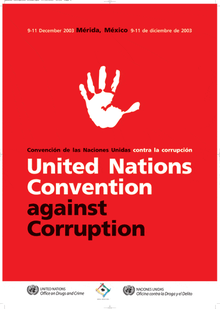
International asset recovery is any effort by governments to repatriate the proceeds of corruption hidden in foreign jurisdictions. Such assets may include monies in bank accounts, real estate, vehicles, arts and artifacts, and precious metals. As defined under the United Nations Convention against Corruption, asset recovery refers to recovering the proceeds of corruption, rather than broader terms such as asset confiscation or asset forfeiture which refer to recovering the proceeds or instrumentalities of crime in general.
Often used to emphasize the "multi-jurisdictional" or cross-border aspects of a corruption investigation, international asset recovery includes numerous processes such as the tracing, freezing, confiscation, and repatriation of proceeds stored in foreign jurisdictions, thus "making it one of the most complex projects in the field of law".[1] Even considering the difficulties present, Africa specialist Daniel Scher counters that international asset recovery's "potential rewards in developing countries make it a highly attractive undertaking".[2]
Despite domestic legislation in some countries allowing for the confiscation and forfeiture of proceeds of corruption, it is improvements in finance, transportation, and communications technologies in the 20th century that have made it easier for corrupt leaders and other "politically exposed persons" to conceal massive amounts of stolen wealth in offshore financial centers.
By taking advantage of differences in legal systems, the high costs in coordinating investigations, lack of international cooperation, and bank secrecy in some recipient countries, corrupt officials have been able to preserve much of their loot overseas.
- ^ Smith, Jack; Pieth, Mark; Jorge, Guillermo (February 2007), "The Recovery of Stolen Assets: A Fundamental Principle of the UN Convention against Corruption" (PDF), U4Brief, no. 2, Chr. Michelsen Institute (CMI) – U4
- ^ Scher, Daniel (January 2005). "Asset Recovery". African Security Review. 14 (4): 17–26. doi:10.1080/10246029.2005.9627584. S2CID 153576869.
© MMXXIII Rich X Search. We shall prevail. All rights reserved. Rich X Search
